关于克隆的英语作文
克隆英语作文
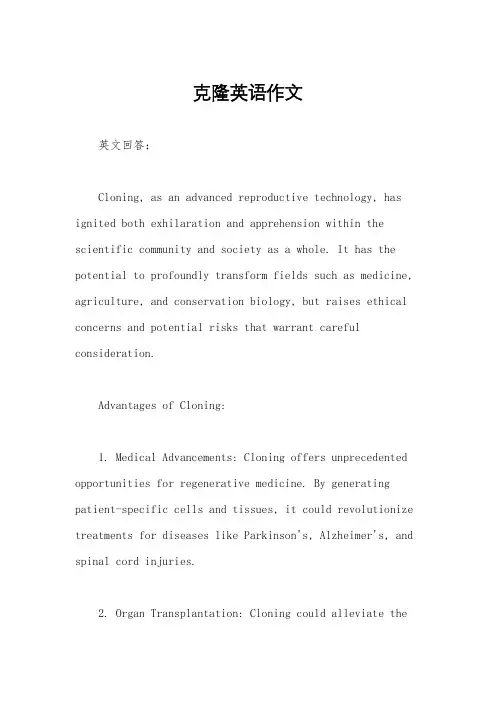
克隆英语作文英文回答:Cloning, as an advanced reproductive technology, has ignited both exhilaration and apprehension within the scientific community and society as a whole. It has the potential to profoundly transform fields such as medicine, agriculture, and conservation biology, but raises ethical concerns and potential risks that warrant careful consideration.Advantages of Cloning:1. Medical Advancements: Cloning offers unprecedented opportunities for regenerative medicine. By generating patient-specific cells and tissues, it could revolutionize treatments for diseases like Parkinson's, Alzheimer's, and spinal cord injuries.2. Organ Transplantation: Cloning could alleviate thesevere shortage of organs for transplantation. By creating compatible organs from a patient's own cells, the risk of rejection and the need for immunosuppressive drugs would be eliminated.3. Agriculture and Food Production: Cloning can improve agricultural productivity by replicating geneticallysuperior animals with desirable traits, leading toincreased yields, disease resistance, and nutritional value.4. Species Conservation: Cloning plays a crucial rolein preserving endangered or extinct species. It enables the creation of genetically identical individuals, restoringlost populations and safeguarding biodiversity.Ethical Concerns of Cloning:1. Human Cloning: The cloning of humans raisessignificant moral and ethical concerns, particularly regarding the potential for exploitation and the commodification of human life.2. Unknown Risks: Cloning is still a relatively novel technology, and there remain uncertainties about the long-term health effects on cloned individuals. Genetic abnormalities or developmental problems could pose risks to their well-being.3. Alteration of Nature: Cloning raises concerns about altering the natural course of evolution and disrupting the delicate balance of ecosystems.4. Social Justice: Access to cloning technology could exacerbate existing social inequalities, leading to further disparities in healthcare and genetic enhancements.Potential Risks of Cloning:1. Genetic Defects: Cloning involves the replication ofa single genome, increasing the likelihood of inheriting harmful genetic mutations or defects that could manifest in health problems.2. Epigenetic Modifications: In addition to geneticalterations, cloning could also lead to epigenetic changes, which are modifications to gene expression without altering the DNA sequence. These changes can impact gene regulation and potentially have long-term consequences.3. Developmental Abnormalities: Cloned animals may experience developmental abnormalities compared tonaturally conceived individuals. This includes an increased risk of malformations, birth defects, or other health issues.4. Environmental Impact: Cloning for agricultural purposes may result in reduced genetic diversity within domesticated species, making them more vulnerable to diseases or environmental changes.Conclusion:Cloning is a groundbreaking technology with both immense potential and complex ethical and risk implications. Its applications hold promise for medical advancements, agricultural productivity, and species conservation.However, it is crucial to proceed with caution, address ethical concerns responsibly, and conduct thorough research to mitigate potential risks before widespread adoption.中文回答:克隆的优势:1. 医学进步,克隆为再生医学提供了前所未有的机遇。
人类克隆的利与弊英语作文80词
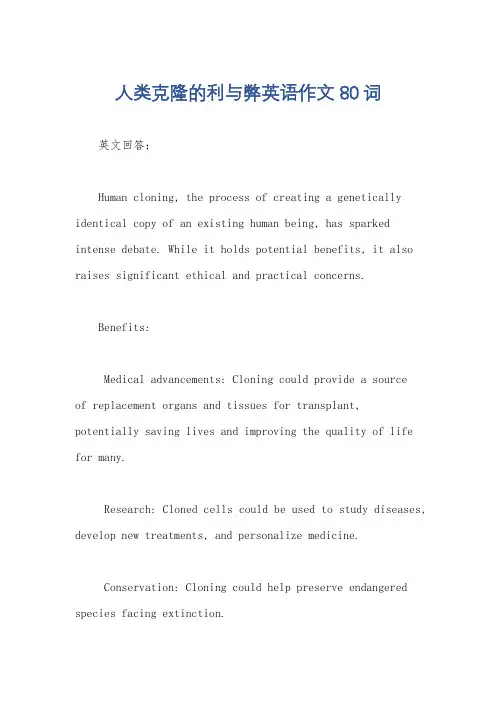
人类克隆的利与弊英语作文80词英文回答:Human cloning, the process of creating a genetically identical copy of an existing human being, has sparked intense debate. While it holds potential benefits, it also raises significant ethical and practical concerns.Benefits:Medical advancements: Cloning could provide a sourceof replacement organs and tissues for transplant,potentially saving lives and improving the quality of life for many.Research: Cloned cells could be used to study diseases, develop new treatments, and personalize medicine.Conservation: Cloning could help preserve endangered species facing extinction.Concerns:Ethical concerns: Cloning raises questions about the identity, autonomy, and dignity of cloned individuals. It could lead to discrimination and create a divide between "original" and cloned individuals.Health risks: The safety of human cloning is still uncertain, as there are concerns about the developmental abnormalities and health problems that could arise in cloned individuals.Social implications: The widespread use of cloning could have unforeseen social consequences, such as a decline in genetic diversity and the potential for genetic manipulation for unethical purposes.Overall, human cloning is a complex issue with both potential benefits and significant ethical concerns. Further research and public discourse are necessary to fully understand the implications and develop appropriateguidelines for its potential use.中文回答:人类克隆的利弊。
英语作文克隆的利弊
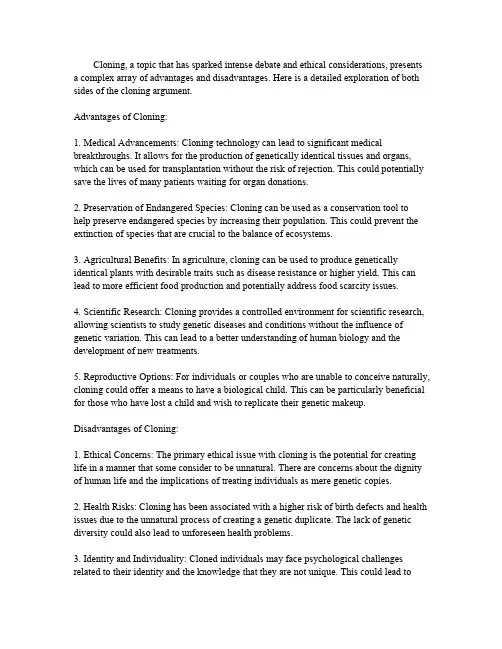
Cloning,a topic that has sparked intense debate and ethical considerations,presents a complex array of advantages and disadvantages.Here is a detailed exploration of both sides of the cloning argument.Advantages of Cloning:1.Medical Advancements:Cloning technology can lead to significant medical breakthroughs.It allows for the production of genetically identical tissues and organs, which can be used for transplantation without the risk of rejection.This could potentially save the lives of many patients waiting for organ donations.2.Preservation of Endangered Species:Cloning can be used as a conservation tool to help preserve endangered species by increasing their population.This could prevent the extinction of species that are crucial to the balance of ecosystems.3.Agricultural Benefits:In agriculture,cloning can be used to produce genetically identical plants with desirable traits such as disease resistance or higher yield.This can lead to more efficient food production and potentially address food scarcity issues.4.Scientific Research:Cloning provides a controlled environment for scientific research, allowing scientists to study genetic diseases and conditions without the influence of genetic variation.This can lead to a better understanding of human biology and the development of new treatments.5.Reproductive Options:For individuals or couples who are unable to conceive naturally, cloning could offer a means to have a biological child.This can be particularly beneficial for those who have lost a child and wish to replicate their genetic makeup. Disadvantages of Cloning:1.Ethical Concerns:The primary ethical issue with cloning is the potential for creating life in a manner that some consider to be unnatural.There are concerns about the dignity of human life and the implications of treating individuals as mere genetic copies.2.Health Risks:Cloning has been associated with a higher risk of birth defects and health issues due to the unnatural process of creating a genetic duplicate.The lack of genetic diversity could also lead to unforeseen health problems.3.Identity and Individuality:Cloned individuals may face psychological challenges related to their identity and the knowledge that they are not unique.This could lead toissues with selfesteem and a sense of individuality.4.Social Implications:The introduction of cloned individuals into society could lead to complex social dynamics,including questions about legal rights,social status,and the potential for discrimination.5.Potential for Abuse:There is a risk that cloning technology could be misused for unethical purposes,such as creating a workforce or soldiers with specific traits,or for the replication of individuals for personal gain.6.Economic and Resource Allocation:The resources required for cloning,including scientific expertise and technological infrastructure,could divert funds and attention away from other important areas of research and development.In conclusion,while cloning offers potential benefits in various fields,it also raises significant ethical,health,and social concerns.The debate surrounding cloning is far from resolved,and it is crucial that society continues to engage in thoughtful discussions about the implications of this technology.。
关于克隆技术的英语作文80词
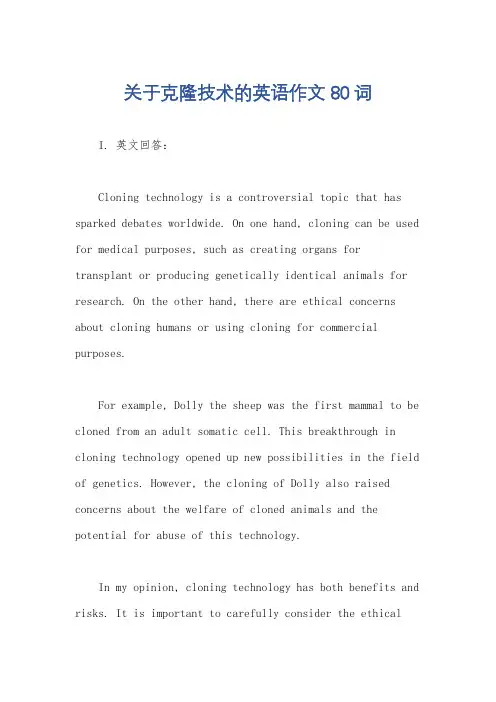
关于克隆技术的英语作文80词I. 英文回答:Cloning technology is a controversial topic that has sparked debates worldwide. On one hand, cloning can be used for medical purposes, such as creating organs fortransplant or producing genetically identical animals for research. On the other hand, there are ethical concerns about cloning humans or using cloning for commercial purposes.For example, Dolly the sheep was the first mammal to be cloned from an adult somatic cell. This breakthrough in cloning technology opened up new possibilities in the field of genetics. However, the cloning of Dolly also raised concerns about the welfare of cloned animals and the potential for abuse of this technology.In my opinion, cloning technology has both benefits and risks. It is important to carefully consider the ethicalimplications of cloning and to regulate its use to ensure that it is used responsibly.II. 中文回答:克隆技术是一个备受争议的话题,引发了全球范围内的辩论。
英语作文克隆
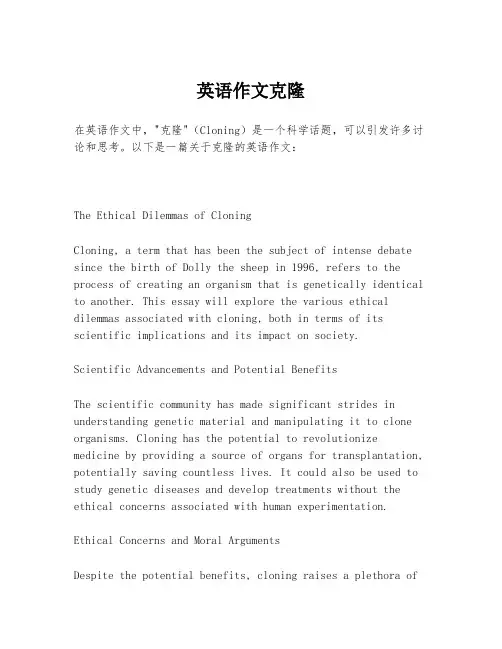
英语作文克隆在英语作文中,"克隆"(Cloning)是一个科学话题,可以引发许多讨论和思考。
以下是一篇关于克隆的英语作文:The Ethical Dilemmas of CloningCloning, a term that has been the subject of intense debate since the birth of Dolly the sheep in 1996, refers to the process of creating an organism that is genetically identical to another. This essay will explore the various ethical dilemmas associated with cloning, both in terms of its scientific implications and its impact on society.Scientific Advancements and Potential BenefitsThe scientific community has made significant strides in understanding genetic material and manipulating it to clone organisms. Cloning has the potential to revolutionize medicine by providing a source of organs for transplantation, potentially saving countless lives. It could also be used to study genetic diseases and develop treatments without the ethical concerns associated with human experimentation.Ethical Concerns and Moral ArgumentsDespite the potential benefits, cloning raises a plethora ofethical concerns. The creation of genetically identical beings raises questions about individuality and identity. If a clone is created, does it have the same rights as its original? What happens if the clone is not identical due to environmental factors? These questions challenge our understanding of what it means to be human.Furthermore, the possibility of human reproductive cloning opens a Pandora's box of moral issues. It could lead to a commodification of human life, with people being created for specific purposes or to fulfill the desires of others. This goes against the fundamental principle of human dignity and the right to self-determination.Social ImplicationsThe social implications of cloning are equally profound. If cloning becomes commonplace, it could lead to a society where genetic diversity is reduced, potentially leading to unforeseen health issues. It could also exacerbate existing social inequalities, as only those who can afford cloning might have access to its benefits.ConclusionThe debate surrounding cloning is complex and multifaceted. While it offers the promise of medical breakthroughs and the potential to alleviate suffering, it also poses significant ethical and social challenges. As a society, we mustcarefully consider the implications of cloning and establish clear guidelines to ensure that it is used responsibly andethically.这篇作文提供了关于克隆的科学进步、潜在好处、伦理问题以及社会影响的讨论,并以一个结论来总结克隆技术所带来的复杂问题。
克隆的好处 英文作文
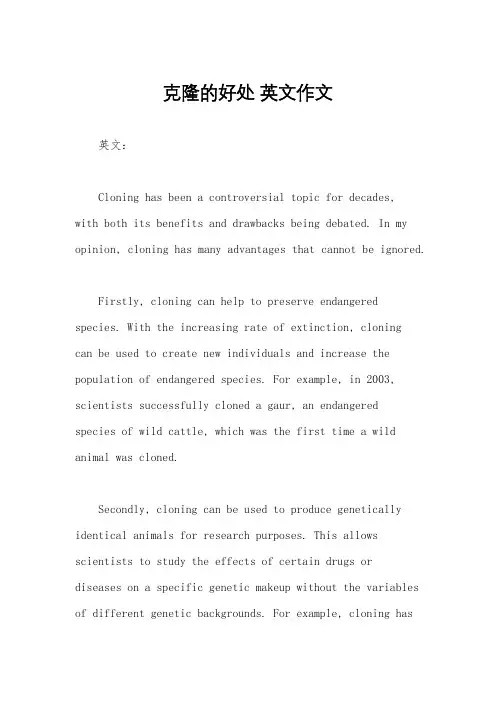
克隆的好处英文作文英文:Cloning has been a controversial topic for decades,with both its benefits and drawbacks being debated. In my opinion, cloning has many advantages that cannot be ignored.Firstly, cloning can help to preserve endangered species. With the increasing rate of extinction, cloningcan be used to create new individuals and increase the population of endangered species. For example, in 2003, scientists successfully cloned a gaur, an endangeredspecies of wild cattle, which was the first time a wild animal was cloned.Secondly, cloning can be used to produce genetically identical animals for research purposes. This allows scientists to study the effects of certain drugs ordiseases on a specific genetic makeup without the variables of different genetic backgrounds. For example, cloning hasbeen used to create mice with specific genetic mutationsfor studying diseases like cancer and diabetes.Lastly, cloning can also be used in the medical fieldto produce organs for transplant. With a shortage of organ donors, cloning can provide a solution by creating organs that are genetically identical to the recipient, reducing the risk of rejection.In conclusion, cloning has many potential benefits that cannot be ignored. While there are also ethical concerns surrounding cloning, the advantages it offers cannot be dismissed.中文:克隆技术是一个长期备受争议的话题,其优缺点一直在被辩论。
克隆英文作文90字
克隆英文作文90字英文:Cloning is a controversial topic in the scientific community. Some argue that it could lead to medical breakthroughs and advancements, while others are concerned about the ethical implications of creating identical copies of living beings. Personally, I believe that cloning should be approached with caution and only used in specific circumstances.For medical purposes, cloning could be beneficial in creating organs for transplant or helping to cure genetic diseases. However, the cloning of entire animals or humans is a different story. It raises questions aboutindividuality and the value of life. Is it ethical to create a clone of a human being, essentially making them a duplicate of someone else? What happens to the clone's sense of self and identity?Furthermore, there are also concerns about the safety of cloning. In the past, cloned animals have had health issues and abnormalities. It is important to thoroughly research and test the effects of cloning before it is widely used.Overall, while there may be potential benefits to cloning, it is important to approach it with caution and consider the ethical implications.中文:克隆是科学界一个备受争议的话题。
关于克隆英文作文
关于克隆英文作文英文:Cloning is a highly debated topic in today's society. Some people believe that it is a beneficial practice that can help us cure diseases and improve our quality of life, while others see it as an unethical and dangerous technology that could have disastrous consequences for humanity.Personally, I believe that cloning has the potential to be a valuable tool for medical research and treatment. For example, cloning could be used to create organs for transplant patients, which would greatly reduce the number of people who die while waiting for a donor organ. Additionally, cloning could help us better understand and treat genetic diseases, such as cancer and Alzheimer's.However, there are also valid concerns about theethical implications of cloning. For one, cloning raisesquestions about the value of human life and the potential for abuse by those in power. Additionally, there are worries about the safety of cloning technology and the potential for unintended consequences, such as the creation of clones with genetic defects or abnormalities.Despite these concerns, I believe that cloning should be allowed for medical purposes as long as it is heavily regulated and monitored. With proper oversight, cloning could be a valuable tool for advancing medical research and improving our quality of life.中文:克隆是当今社会上备受争议的话题。
关于克隆好处与坏处的英语作文
关于克隆好处与坏处的英语作文英文回答:Benefits of Cloning.1. Preservation of Endangered Species: Cloning can help preserve endangered species by creating copies ofindividual animals with unique genetic traits. This ensures the survival of the species and maintains biodiversity.2. Medical Research and Treatment: Cloning can contribute to advancements in medical research by creating genetically identical models of human cells and tissues. These models can be used to study diseases, develop treatments, and test new therapies.3. Organ and Tissue Transplantation: Cloning has the potential to address the shortage of organs and tissues for transplantation. By creating patient-specific organs and tissues, the risk of rejection is reduced, and patients canreceive life-saving treatments.4. Animal Husbandry and Agriculture: Cloning can improve animal breeding practices in agriculture. By creating clones of animals with desired traits, such as enhanced productivity, disease resistance, or growth rate, farmers can increase the efficiency and profitability of their operations.5. Genetic Engineering: Cloning techniques can be combined with genetic engineering to create animals with specific genetic modifications. This has applications in research, agriculture, and medicine, allowing scientists to create organisms with desirable traits or to study the effects of gene mutations.Drawbacks of Cloning.1. Ethical Concerns: Cloning raises ethical concerns about the creation of genetically identical individuals and the potential for human reproductive cloning. Ethical guidelines are necessary to ensure the responsible use ofcloning technology.2. Genetic Diversity: Cloning may reduce genetic diversity within a species, making them more susceptible to disease outbreaks or environmental changes. Genetic diversity is crucial for the survival and resilience of populations.3. Unforeseen Medical Consequences: The long-term health effects of cloning are not yet fully understood. Cloned animals may face health issues that are not evident in the original animal, raising concerns about their well-being.4. Cost and Accessibility: Cloning is a complex and expensive procedure, which may limit its accessibility for certain individuals or organizations. Equitable access to cloning technology is important to ensure its benefits are not concentrated among a few.5. Animal Welfare Concerns: Cloning involves procedures that may cause discomfort or distress to animals used inthe process. Ensuring the humane treatment of animals is essential when considering cloning.中文回答:克隆的优点。
关于克隆好处与坏处的英语作文
关于克隆好处与坏处的英语作文Cloning technology is a controversial topic, with varying opinions on its merits and demerits. Some people support it, some oppose it, and others are undecided. Indeed, cloning has both advantages and disadvantages.The benefit of cloning lies in its ability to produce genetically identical individuals, which simplifies medical research. Take Dolly the Sheep as an example, the first mammal cloned through somatic cell nuclear transfer.A small portion of her tissue can be used to study various diseases, and her organs can potentially save lives. Additionally, cloning can be applied to replicate endangered animals, preserving biological diversity. We can even freeze rare animals' cells, giving them a chance at life in the future.However, cloning also has negative impacts. Firstly, as it often involves living organisms, ethical questions arise. Human cloning, for instance, can lead to violations of human dignity and goes against natural laws. Moreover, cloning is expensive, making it susceptible to misuse for commercial gain. Also, the success rate of cloning is currently low, with most clones perishing shortly after birth, and survivors often suffer from congenital defects.Therefore, we should approach cloning technology with caution, weighing the benefits against the risks. We need to be in control of this technology rather than being controlled by it, ensuring it doesn't pose a threat to humanity.""克隆技术,一提到这个词,人们的反应不尽相同:有人赞同、有人反对、有人犹豫不决。
